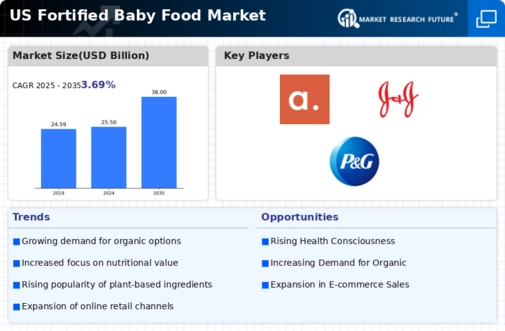Rising Disposable Income
Rising disposable income among families is significantly impacting the fortified baby-food market. As household incomes increase, parents are more willing to invest in premium baby food products that offer enhanced nutritional value. This trend is particularly evident in urban areas, where families are increasingly opting for fortified options that promise better health outcomes for their children. Market analysis suggests that the premium segment of the fortified baby-food market has expanded by approximately 10% in the past year, driven by this willingness to spend on quality. Furthermore, as economic conditions improve, the trend of prioritizing health and nutrition is expected to persist, further bolstering the market. The fortified baby-food market stands to benefit from this economic shift, as families seek products that align with their aspirations for their children's health.
Innovations in Product Formulation
Innovations in product formulation are playing a crucial role in shaping the fortified baby-food market. Manufacturers are increasingly developing new recipes that incorporate a variety of nutrients, catering to the evolving preferences of health-conscious parents. For instance, the introduction of organic and plant-based fortified baby foods has gained traction, appealing to a demographic that values sustainability and natural ingredients. This innovation is not only enhancing the nutritional profile of baby foods but also expanding the market reach. Recent data indicates that the market for organic fortified baby foods has grown by 20% in the last year, highlighting the potential for continued expansion. As companies invest in research and development to create unique formulations, the fortified baby-food market is likely to see sustained growth driven by consumer demand for innovative and health-oriented products.
Nutritional Awareness Among Parents
The fortified baby-food market is experiencing a surge in demand due to heightened nutritional awareness among parents. As caregivers increasingly prioritize the health and well-being of their children, they seek products that offer enhanced nutritional benefits. This trend is reflected in the market, where sales of fortified baby foods have risen by approximately 15% over the past year. Parents are more informed about the importance of vitamins and minerals in early childhood development, leading to a preference for fortified options. This shift in consumer behavior is likely to continue, as educational campaigns and health initiatives promote the significance of proper nutrition in infancy. Consequently, the fortified baby-food market is positioned to grow as parents actively seek out products that align with their nutritional goals for their children.
Influence of Pediatric Recommendations
The fortified baby-food market is significantly influenced by pediatric recommendations regarding infant nutrition. Healthcare professionals play a pivotal role in guiding parents on the best dietary practices for their children. As pediatricians increasingly advocate for the inclusion of fortified foods in infants' diets, parents are more inclined to choose these products. This endorsement from trusted sources is likely to enhance consumer confidence in fortified baby foods. Recent surveys indicate that approximately 70% of parents consider pediatric advice when selecting baby food, underscoring the impact of professional recommendations. Consequently, the fortified baby-food market is expected to grow as healthcare providers continue to emphasize the importance of fortified options in promoting healthy development during infancy.
Increased Focus on Early Childhood Nutrition
The fortified baby-food market is witnessing growth due to an increased focus on early childhood nutrition. Research indicates that proper nutrition during the formative years is critical for cognitive and physical development. As a result, parents are becoming more discerning about the food choices they make for their infants. This awareness is driving demand for fortified baby foods that provide essential nutrients, such as iron, calcium, and vitamins. Recent statistics show that the market for fortified baby foods has seen a growth rate of 12% annually, reflecting this shift in consumer priorities. As educational initiatives and healthcare professionals emphasize the importance of nutrition in early childhood, the fortified baby-food market is likely to expand further, catering to the needs of health-conscious parents.














Leave a Comment